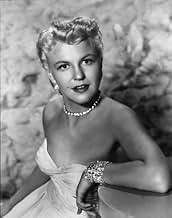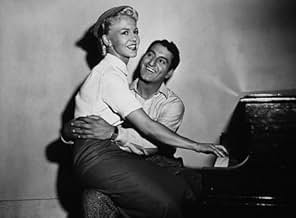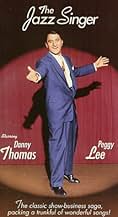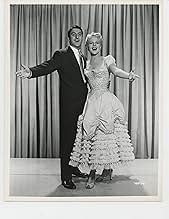Añade un argumento en tu idiomaJerry dreams of becoming a famous jazz singer, but to accomplish that, he must defy his father, a Jewish Cantor who opposes such a dream as a future for a son of his.Jerry dreams of becoming a famous jazz singer, but to accomplish that, he must defy his father, a Jewish Cantor who opposes such a dream as a future for a son of his.Jerry dreams of becoming a famous jazz singer, but to accomplish that, he must defy his father, a Jewish Cantor who opposes such a dream as a future for a son of his.
- Nominado para 1 premio Óscar
- 1 nominación en total
Murray Alper
- Taxi Driver
- (sin acreditar)
Jimmy Ames
- Music Store Proprietor
- (sin acreditar)
Argumento
¿Sabías que...?
- CuriosidadesMichael Curtiz originally wanted Doris Day to play the role of Judy Lane.
- PifiasCatwalks, lights and other equipment rigged to the roof of the sound stage are clearly visible during a shot of an audience supposedly sitting in a real theater.
- ConexionesReferenced in The Danny Thomas Show: Linda, the Performer (1960)
Reseña destacada
Rich looking redo of the legendary Jolson film that revolutionized the film industry ushering sound in and silence out.
The thing is that it was the technology that was the big deal about the film not the story which is pure hokum. However that seems to be something that the studio chose to ignore assuming the name recognition of the title would draw the crowds. The film did okay but it's a cornball exercise from start to finish. The main story was dated in '27 and is certainly no fresher in '52.
Danny Thomas just didn't have the strength of personality to make it on the big screen. Watching him it becomes apparent why he made it on TV and not cinema. He has a nice, likable demeanor, the sort that worked so well for Perry Como and Dinah Shore when they likewise abandoned the big screen for the small, but he doesn't dominate his scenes the way a leading man has to. He does sing well although not nearly well enough to be the rage of New York he's supposed to be.
That master of all genres Michael Curtiz moves the movie along well enough but it's too schmaltzy for him to be able to make it really memorable.
Putting all that aside the best reason to catch the film is the presence of Peggy Lee in the cast. This was her acting debut and while she doesn't have the instantly easy relaxed acting style of Doris Day the role doesn't put big demands on her, she did much better a few years on in Pete Kelly's Blues. It doesn't matter though when she sings which fortunately is often. When she does that all the hokeyness melts away and the viewer is treated to a legend doing what she does best, sing. An extra bonus is that she performs one of her biggest hits, Lover, in an elegant club setting giving you an idea of what it was actually like to see her in person.
Worth catching for Miss Lee but the story is sappy.
The thing is that it was the technology that was the big deal about the film not the story which is pure hokum. However that seems to be something that the studio chose to ignore assuming the name recognition of the title would draw the crowds. The film did okay but it's a cornball exercise from start to finish. The main story was dated in '27 and is certainly no fresher in '52.
Danny Thomas just didn't have the strength of personality to make it on the big screen. Watching him it becomes apparent why he made it on TV and not cinema. He has a nice, likable demeanor, the sort that worked so well for Perry Como and Dinah Shore when they likewise abandoned the big screen for the small, but he doesn't dominate his scenes the way a leading man has to. He does sing well although not nearly well enough to be the rage of New York he's supposed to be.
That master of all genres Michael Curtiz moves the movie along well enough but it's too schmaltzy for him to be able to make it really memorable.
Putting all that aside the best reason to catch the film is the presence of Peggy Lee in the cast. This was her acting debut and while she doesn't have the instantly easy relaxed acting style of Doris Day the role doesn't put big demands on her, she did much better a few years on in Pete Kelly's Blues. It doesn't matter though when she sings which fortunately is often. When she does that all the hokeyness melts away and the viewer is treated to a legend doing what she does best, sing. An extra bonus is that she performs one of her biggest hits, Lover, in an elegant club setting giving you an idea of what it was actually like to see her in person.
Worth catching for Miss Lee but the story is sappy.
- jjnxn-1
- 5 sept 2014
- Enlace permanente
Selecciones populares
Inicia sesión para calificar y añadir a tu lista para recibir recomendaciones personalizadas
- How long is The Jazz Singer?Con tecnología de Alexa
Detalles
Taquilla
- Recaudación en Estados Unidos y Canadá
- 4.360.000 US$
- Duración1 hora 47 minutos
- Relación de aspecto
- 1.37 : 1
Contribuir a esta página
Sugerir un cambio o añadir el contenido que falta

Principal laguna de datos
By what name was The Jazz Singer (1952) officially released in Canada in English?
Responde

































